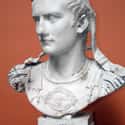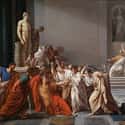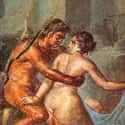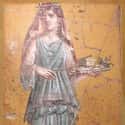(#9) MYTH: Nero Played The Fiddle As Rome Burned
Reality: A fire wiped out more than 70% of Rome in 64 AD. It raged for six whole days and left about half the city's population homeless. Emperor Nero was Rome's leader at the time, but he was widely known as an unpopular and corrupt ruler.
Rather than playing a fiddle while watching his city burn, Nero was at his villa in Antium, 35 miles away from Rome. When he learned of the fire, he immediately went to the city to start relief measures, although the people still didn't trust him and believed he started the fire.
Why The Myth: The Roman historian Tacitus wrote that Nero watched the city burn while singing about the fall of Troy, but this story was never confirmed. It's more likely that this popular myth was propagated as the result of Nero's image as a poor and corrupt leader.
(#3) MYTH: Caligula Was An Unsalvageable, Deranged Monster
Reality: According to Anthony A. Barrett, author of Caligula: The Corruption of Power, Caligula was neither insane nor particularly evil; he was merely inexperienced and incapable of leading.
Why The Myth: Caligula has been portrayed as an incestuous, perverse, and incompetent ruler of ancient Rome. His incompetence fueled myths and inaccuracies about his reign, including his alleged threat to make his horse a senator, which was more of a jab at the Senate than a serious threat. Unfortunately, most of what we know about the emperor comes from rumors spread by his contemporaries. Through the centuries, he has been depicted as increasingly deranged.
(#8) MYTH: Caesar's Last Words Were 'Et Tu Brute?'
Reality: According to historian Mary Beard, Julius Caesar allegedly said to Brutus, "And you, my child?" in Greek. She also said some of the men hired to take out Caesar mistakenly attacked one another in the frenzy. The assailants all lived through the ordeal, but they left covered in blood.
Why The Myth: The myth stems from William Shakespeare's famous play Julius Ceasar. After the play's titular character is betrayed by his colleagues, he looks at his friend Brutus and says, "Et tu, Brute?"
(#7) MYTH: Ancient Rome Was An Orgy-Crazed Society
Reality: According to classical scholar Alastair Blanshard, intimate encounters invovling multiple partners were uncommon in ancient Rome. There are few firsthand accounts of such activities in ancient Rome, despite their constant presence in film and television depictions of the Roman Empire.
Why The Myth: It's believed that Christian writers used satirical writing by Romans to reframe the pagan society as a community marked by depravity, gluttony and lechery. Depicitons of outrageous bacchanals emphasized the lust and decadence of the ancient period in order to denounce it.
(#10) MYTH: Women Had A Lot Of Power In Ancient Rome
Reality: Historian Mary Beard contends that women in ancient Rome had it pretty good when compared to other ancient Mediterranean women. They owned property and were occasionally entrepreneurs, but that isn't saying much. Women of ancient Rome had neither formal political rights nor the right to vote, and were thus politically powerless.
Why The Myth: Roman historians told of women who pulled the strings of many political conspiracies. According to Beard, however, women were often used as political scapegoats and easy targets of blame and ire for the government's faults.
(#5) MYTH: Gladiators Resemble What You Saw In 'Gladiator'
Reality: While Hollywood films often portray gladiator matches as bloody, horrifying sporting events in which slaves battled each other for the entertainment of the masses, actual gladiator events in ancient Rome looked quite a bit different.
According to historian Mary Beard, who's written several books on ancient Rome, largescale bloodbaths were probably the exception to the rule because gladiators were pricy investments. Most owners wouldn't want to risk losing them. Instead of fighting other people or lions, it was much more common for gladiators to fight wild boar.
Why The Myth: This myth has mostly been propagated by movies. Audiences going to watch movies like Gladiator or Spartacus prefer to see something dramatic, even if it means sacrificing some historical accuracy.
New Random Displays Display All By Ranking
About This Tool
The history of ancient Rome is surrounded by many legends and romantic auras. There are many novels, plays, and movies about this ancient civilization. However, many successful works of art also distort the true history of ancient Rome. In the 2nd century BC, Greece gradually declined, and the ancient Romans replaced the Greeks in the Mediterranean. They inherited the achievements of the Greeks and absorbed the image and content of Greek mythology.
Nobles, gladiators, philosophical thoughts, are the first things people will think of when mentioning the history of ancient Rome. The random tool explained 10 myths about ancient Rome that you did not know before.
Our data comes from Ranker, If you want to participate in the ranking of items displayed on this page, please click here.
















